Frankincense and myrrh: Modern day story of the gifts of Christmas
- Published
Both frankincense and myrrh are farmed in Kenya
A Christmas tradition that can be traced back to the story of Jesus's birth in Bethlehem is the exchange of gifts.
The Bible records that wise men took him gifts of gold, frankincense and myrrh.
Gold we all know, but where on earth does one find the other two in the present day?
The search for them led me to Wajir in north-eastern Kenya.
Half an hour's drive from the town there is a 20-acre (eight-hectare) plantation of myrrh trees and boswelia, the tree that produces frankincense.
Medicinal
Hareth Hassan has been tending the trees for 15 years since inheriting the plantation from his father.
"We treasure these trees because their resin has many medicinal uses," he says.
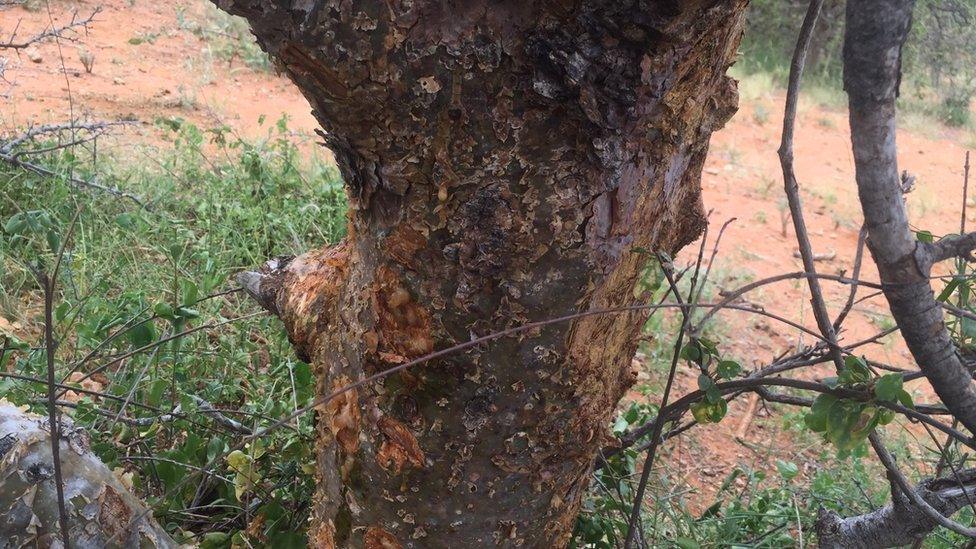
The resin of the myrrh tree has medicinal uses - but, sold raw, goes for just $8 - or even $4 - per kilogram
"We spray it in our homes to repel snakes and insects. Also when someone gets sick, we apply it on them, for example when you feel pain on the hand. And if you break a limb, before correcting it, we apply myrrh on the affected area."

What are they used for?
Frankincense - locally it is chewed as gum, ground into powder and burnt as incense, used as a perfume and for a wide range of ailments; commercially it is used as an essential oil in perfume, cosmetic and flavour industries
Myrrh - Egyptians used it for embalming mummies, and in the Bible it is said to have been mixed with wine to be used as a painkiller for Jesus; locally used as an ink in Islamic schools, burned to repel insects and snakes, as a medicine; commercially used in perfumes, flavours and cosmetics (such as stomach remedies, mouthwashes and toothpaste)

Four collectors arrive carrying an axe and recycled plastic containers. They walk around the farm looking for resin that is ready for harvesting.
They also make shallow cuts on the tree trunks and branches to stimulate the production of myrrh resin.
Mr Hassan works closely with Ambia Osman, an officer from the Kenya Forests Service.
"These trees grow naturally and so it's important to conserve them," says Ms Osman, who says she teaches the collectors not to overtap the resins.
"But they don't make much because they sell it raw," she adds.
We drive back to Wajir town, a small but busy business centre. Ms Osman shows us several shops that stock myrrh, frankincense and other natural products.
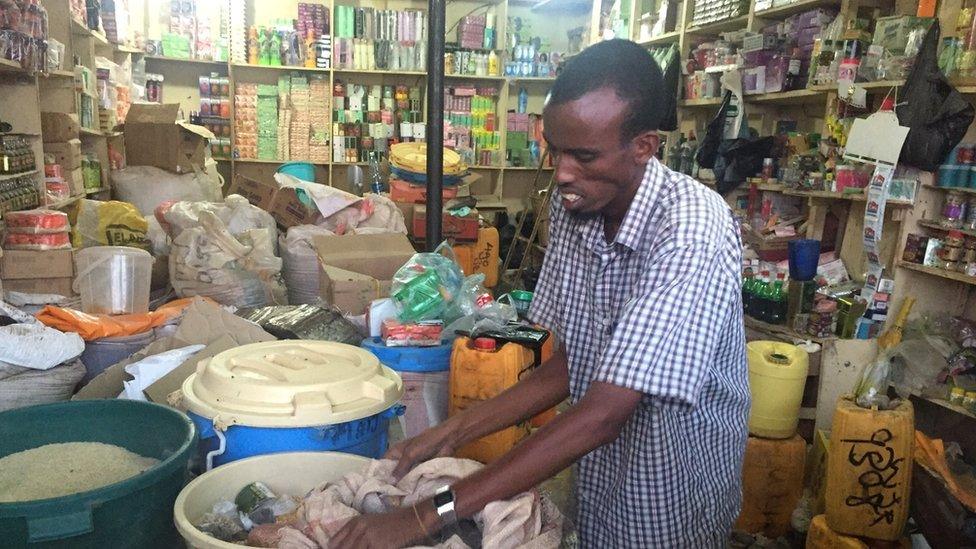
Myrrh, frankincense and other natural products can be found for sale in Wajir's small shops
In one of the shops, the trader brings us a sack containing brown lumps of myrrh. They look like dried fruit.
"A kilogram of myrrh goes for $8 (£5.40)," says the shopkeeper.
Sometimes it can sell for as little as $4.
"They would be making much more if we had a factory in Wajir to add value to the product," says Ms Osman.
Strong and sweet
One of the few factories that does process frankincense is in the capital, Nairobi.
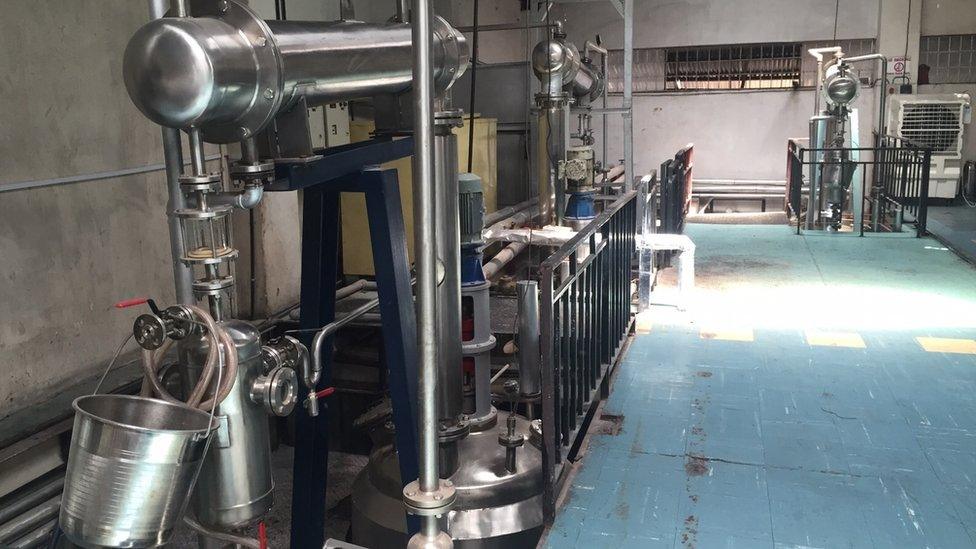
At factories like this, frankincense can be processed into a more profitable product
A strong, sweet scent hits me as I walk into Lubanchem Limited in Nairobi's industrial area.
The factory is the brainchild of a pharmaceutical chemist Sadqa Haq.
"My father brought home some frankincense in 1997 and that's when I got the idea to set up a plant to extract it," she says.
Two of her employees spread pieces of raw frankincense on the floor and start sorting them.
"We do the sorting and put it into different grades of the gum."
She tells me that this consignment comes from Somalia.
The trees grow in arid and semi-arid areas of northern Kenya, Somalia and parts of Ethiopia.
They are also found in Oman and Yemen across the Red Sea in the Middle East.
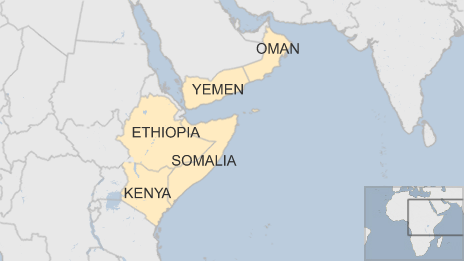
"The frankincense trees mainly grow in areas with alkaline soil with a lot of limestone so there is very little other vegetation there. The harsher the conditions, the finer the oil that comes out of these plants," says Ms Haq.
The oil is extracted through a process of distillation. Once the gum has been sorted, it is boiled and the vapour - a mixture of water and oil, taken through a condensation compartment.
At that point the oil and water separate. The clear golden oil is then packaged for sale.
Growing market
Ms Haq exports all her products to the US, Europe, Japan and Australia.
"The market in sub-Saharan Africa has been growing but not many people know about frankincense," she says.
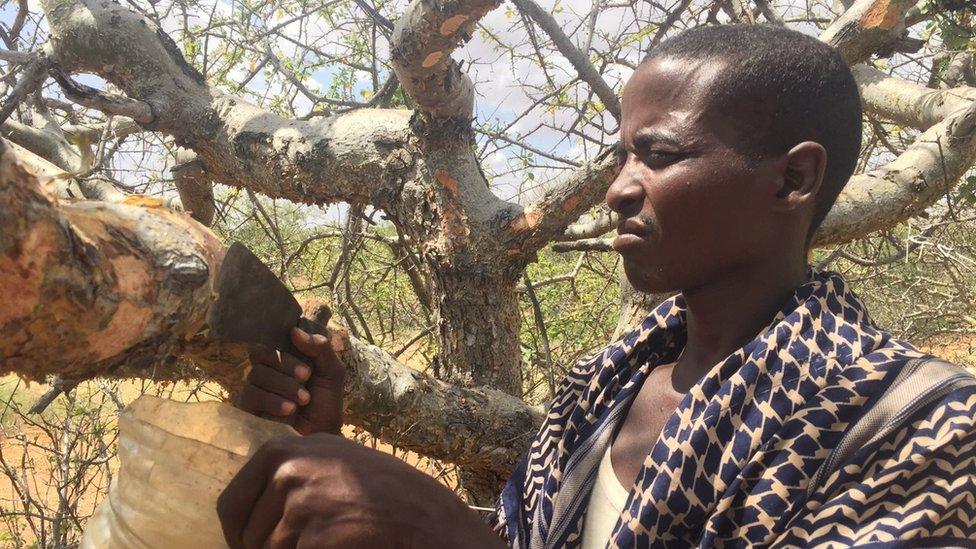
Frankincense resin comes from the boswelia tree - which loves a harsh, dry climate
She says most of her customers use the product to treat various ailments and its medicinal properties are being reseached in the US.
"It's being used to treat bleeding gums and bad breath... in meditation and aromatherapy it's used for its calming and cooling effect."
It's clear the three wise men of two millennia ago found the perfect gifts to give to a baby - frankincense and myrrh for the family's health and gold for wealth.
Gifts that would still be well received today.
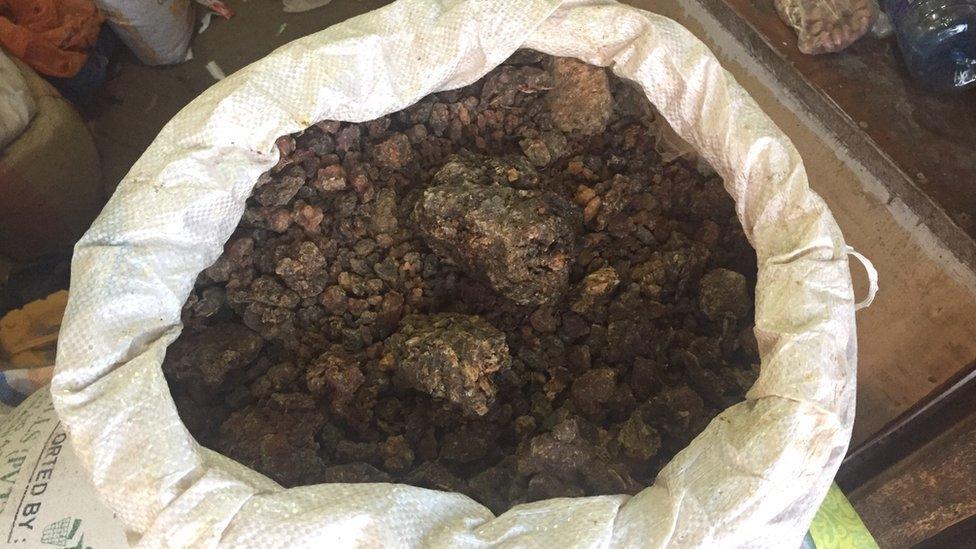
A sack of unprocessed myrrh